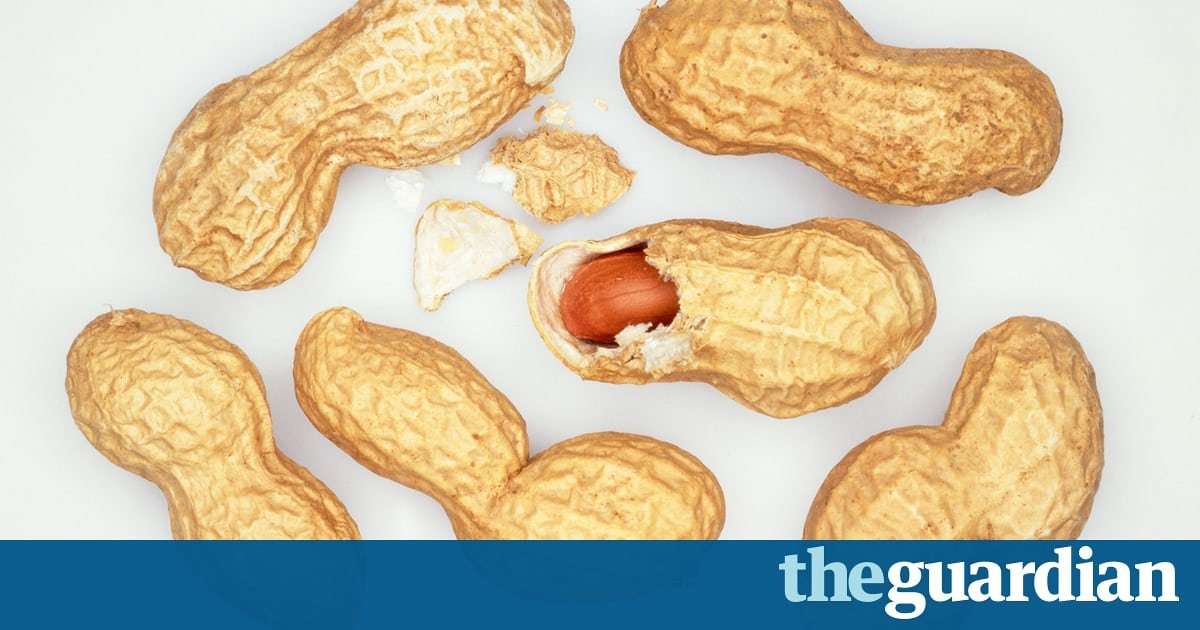Australian researchers hail breakthrough after ‘life-changing’ tolerance persists for up to four years
Australian researchers have made a breakthrough in the treatment of peanut allergy in children.
A small clinical trial conducted at the Murdoch Children’s Research Institute has led to two-thirds of children treated with an experimental immunotherapy treatment being cured of their allergy. Importantly, this desensitisation to peanuts persisted for up to four years after treatment.
The scariest thing about leaving home? My severe nut allergy Read more
“These children had been eating peanut freely in their diet without having to follow any particular program of peanut intake in the years after treatment was completed,” said the lead researcher, Prof Mimi Tang.
Peanut allergy is the most common cause of anaphylaxis, a life-threatening allergic reaction, and one of the most common causes of death from food allergy.
To combat this Tang, an immunologist and allergist, pioneered a new form of treatment that combines a probiotic with peanut oral immunotherapy, known as PPOIT. Instead of avoiding the allergen, the treatment is designed to reprogram the immune system’s response to peanuts and eventually develop a tolerance.
It’s thought that combining the probiotic with the immunotherapy gives the immune system the “nudge” it needs to do this, according to Tang.
Forty-eight children were enrolled in the PPOIT trial and were randomly given either a combination of the probiotic Lactobacillus rhamnosus with peanut protein in increasing amounts, or a placebo, once daily for 18 months.
At the end of the original trial in 2013, 82% of children who received the immunotherapy treatment were deemed tolerant to peanuts compared with just 4% in the placebo group.
Four years later, the majority of the children who gained initial tolerance were still eating peanuts as part of their normal diet and 70% passed a further challenge test to confirm long-term tolerance.
Allergies and food intolerances on flights – how do airlines react? Read more
Tang said the results were exciting and had been life-changing for participants. “The way I see it is that we had children who came into the study allergic to peanuts, having to avoid peanuts in their diet, being very vigilant around that, carrying a lot of anxiety with that and, at the end of treatment and even four years later, many of these children who had benefited from our probiotic peanut therapy could now live like a child who didn’t have peanut allergy.”
The results are published in the Lancet Child & Adolescent Health.
If confirmed by larger clinical studies, the broader hope is that this treatment can have an impact on the high rates of food allergy among children.
“This is a major step forward in identifying an effective treatment to address the food allergy problem in western societies,” Tang said.

Ionlavender on August 19th, 2017 at 10:05 UTC »
Would this same technique work for adults
Also its odd how the body decides that this protien is so bad for you, the only option is to close off your windpipe to protect you.
randersizl on August 19th, 2017 at 09:41 UTC »
As a lifelong peanut allergy dude, this is great to hear, its a difficult thing to deal with and im happy a cure is on its way... that being said fuck peanuts, i will never eat them
attorneyjlp on August 19th, 2017 at 07:51 UTC »
I have a friend who is doing this in CA. First they start with patches on the skin of things the child is mildly allergic to. Then the doctor introduces ingesting small particles of allergens and eventually moves on to ingesting the whole thing. Slowly the body gets used to it. It's amazing that a child who was once highly allergic can now safely eat the same thing that cold have killed him months prior.
Edit- add link to doctor. https://www.oit101.org/research/dr-randhawas-unique-oit-protocol-and-his-approach-to-desensitization/